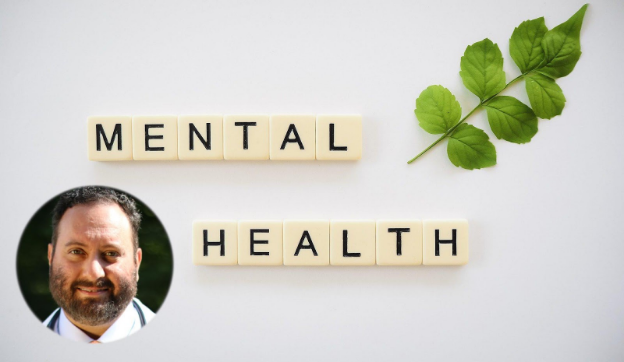Approximately 26% of American adults suffer from a mental health condition, but up to 75% of the affected people do not get treatment. For people with mental health disorders such as anxiety, depression, and bipolar disorder, avoiding treatment could lead to worse outcomes. Dr. Alddo Molinar from the East Ohio Regional Hospital says: "mental health stigma often prevents people from seeking treatment."
"The fear of being called a mental health patient means people will delay or avoid seeking help," he says.
Stigma comes from negative attitudes, thoughts, and stereotypes. It often leads to prejudice and discrimination against those with any kind of mental illness. Stigma is powerful, as it may make people fear and feel ashamed of their condition, even if it's out of their control.
For mental health patients who struggle with an already difficult situation, prejudice and stigma are an unnecessary addition to their problems, which may make it even more difficult to get the help they really need. Although stigma has declined over the last few years, more still needs to be done to end it.
Dr. Alddo Molinar: Common Stigmas around Mental Health
Stigma is the discrimination against another person because of an individual characteristic like a health condition or mental illness.
According to Dr. Molinar, common stigmas surrounding depression and other mental health issues include ideas that:
-
Individuals with mental health issues are weak
-
People with mental illnesses are violent or dangerous
-
People with mental illnesses are incompetent
-
Mental health issues do not affect kids or teens
-
Addiction is a weakness and not a disease
-
People with mental illness cannot recover
"Studies and experience have dispelled all of these myths," says Dr. Molinar.
A mental health issue isn't something you should have to struggle with for the rest of your life.
Dr. Molinar notes that many people with mental illnesses can recover and be successful again.
Where Does Stigma Come From?
Dr. Alddo Molinar says that the root cause of stigma is fear. The stigma surrounding mental health disorders comes from incorrect and inaccurate views that the mentally ill are different from other people.
Ancient beliefs contributed to the stigma, and those with mental illnesses were sometimes shunned, feared, and even locked up. Many people do not fully understand mental health disorders and may have wrong perceptions or ideas about treatment or about the issue itself.
The media plays a major role in exposing people to the topic of mental health. Unfortunately, the coverage isn't always favorable, accurate, or tells the whole story
"Salacious headlines may sell newspapers or mouse-clicks, but they don't do justice to the millions of Americans that maintain a mentally healthy lifestyle with the help of medications and therapy," says Dr. Molinar.
"The media also sometimes portray people with mental illnesses as weak, violent, or even dangerous." Thankfully, some of those attitudes are beginning to change. But, if everyone has an honest conversation about mental health, those affected can feel more comfortable about seeking help.
Dr. Alddo Molinar: Ways to Fight Mental Health Stigma
Dr. Molinar shares helpful tips to help break down the stigma surrounding mental health:
1. Acknowledge the harmful consequences of stigma
The most common effects of mental health stigma include:
-
Feelings of shame, helplessness, and isolation
-
Low self-esteem
-
Reluctance to seek help or treatment
-
Lack of understanding
-
Fewer opportunities for social relationships or employment
-
Bullying, harassment, or physical violence
-
Difficulty at work or school
By acknowledging the harmful effects of stereotypes about mental health disorders, you can identify ways to change attitudes towards mental health.
2. Start Talking Openly About Mental Health
When the mentally ill see or hear other people talk openly about their mental health experiences, it helps give everyone a better understanding of the topic and more open spaces where stigmas and stereotypes can start to be changed.
According to Dr. Alddo Molinar, stigma creates a "them" and "us" kind of thinking. But if people speak openly about their mental health challenges, it helps to reduce shame and discrimination.
"People can start to see how others who have struggled with anxiety, depression, or bipolar disorders have been able to seek help," says Dr. Molinar.
3. Create awareness about mental health
Another great way to reduce mental health stigma is by educating yourself and others about mental illnesses. This includes sharing accurate facts and information about mental health disorders, such as depression and anxiety disorders.
Education should also include using the right terminology. This includes separating the individual from the diagnosis.
It also includes acknowledging the fact that mental illness is treatable and underlines the fact that mental health is as important as physical health. Dr. Molinar says that educating others about mental health disorders can help remove any form of embarrassment or shame.
4. Watch your words
When you're mindful of your language, you use words that are positive, acceptable, and encouraging.
"Don't throw around words that put down people with mental health disorders," advises Dr. Molinar.
"Doing this only adds to the prejudices and stereotypes towards mental illness and makes it harder for people to seek help."
"Consider how challenging the condition may be for the individual, and let that guide your words and actions."
5. Share personal stories of recovery
Whether you are personally recovering or helping a family member through their recovery, consider sharing your story to show that recovery is possible.
"Personal stories can change other people's views about mental health," says Dr. Molinar. "We need to encourage people to share their stories about how they overcame their mental health challenges."
Sharing your experiences with mental illness is a great way to motivate others to speak openly about their recovery journey.
"Sharing personal experiences can help remove the stigma and allow people to recognize that anyone can suffer from a mental health issue," adds Dr. Molinar.
6. Promote the idea that mental health and physical health are equal
Dr. Alddo Molinar encourages us to think about how we would treat people with heart disease, diabetes, or cancer and draw comparisons to how we may best approach and support individuals with mental health concerns.
"When more and more people recognize the facts about mental health disorders, they will start to recognize that demeaning or joking comments could have the opposite effect from what is most needed," he explains.
He reminds people they wouldn't find fun in mocking someone with a physical health condition like cancer or diabetes, but instead would often offer their empathy, support, and concern.
7. Show Love and Solidarity
Showing solidarity with a friend or relative diagnosed with mental illness is also a great way to remove the stigma.
"People with mental health disorders need love and respect. Not judgment, prejudice, or stigma," says Dr. Molinar.
Remember, anyone can experience a mental health issue, and showing love, respect, and support can help normalize speaking about mental health.
Showing love and solidarity includes telling people you stand with them and that you care about them.
8. Request the media to be fair in their coverage
Dr. Alddo Molinar also encourages the media and online news outlets to report on mental health problems fairly without stigmatizing them.
"People should stand up against negative comments, programs, or stories about people living with a mental illness," he says.
It is encouraging that more and more celebrity advocates are starting to encourage the media remove the fear and stigma from their discussion of mental health issues.
9. Avoid self-blame or self-stigma
Many people with mental health issues struggle with self-stigma and low self-esteem. Everyone needs to do everything they can to defeat self-stigma because it can stop someone from seeking help.
You may wrongly believe that your mental health issue is your fault or a sign of weakness. When you think negatively about yourself, it is self-induced shame.
"If you feel bad about yourself because of your condition, just know that you're not alone," says Dr. Molinar.
"Remember, recovery is possible. It can take time, but you can find help and know that it is okay to feel the way you feel."
Dr. Alddo Molinar: Finding Professional Help
If you're experiencing mental health challenges, or are worried about someone else, contact a mental health professional. Mental health professionals will often have resources available and be able to offer support in getting needed help or assistance.
© 2024 NatureWorldNews.com All rights reserved. Do not reproduce without permission.
* This is a contributed article and this content does not necessarily represent the views of natureworldnews.com






